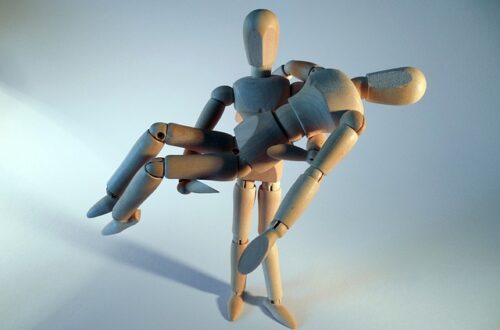
The basic income
Is the human being creative, honest and capable of selfless activity?
– written by Erik Bornscheuer –
The so-called “unconditional basic income” grants every adult citizen a sum sufficient for living, which is paid by the state for life and does not have to be refunded.
Just imagine it: being able to live without having to earn money! When I asked some Italian friends what they thought about it, they said: “With us Italians, this will certainly not work! Everyone would stop working immediately”. In my country of origin, Germany, there was a similar answer, and I must say that until recently I thought the same way. But are we human beings really so comfortable that we have to be driven by the need to survive in order to work? Couldn’t there perhaps be other reasons to become active, for example to create something beautiful or useful and thereby give meaning to life?

Working for others as a social necessity may not only be an imposed duty of modern society, but a deep desire that is naturally inherent in us humans. However, for this to happen, the conditions, such as wages and participation in the production process, as well as participation in what is produced, must be fairly chosen. It would no longer be necessary to work alone for the sake of money, which would make it easier for everyone to find ” his place” in the social structure.
With regard to the labour situation, which will become scarce in the future due to the already started “Industrialisation 4.0” (1), the idea of a basic income could even become a saving anchor. It could effectively counteract the threat of depression and degeneration due to a lack of employment and a lack of meaning in life. We humans really want to develop our talents, participate in social life and contribute in a productive way with appropriate compensation, don’t we? The question is whether there is really a concept that can meet this high ethical standard?
The answer is “yes”, there is a concept that takes into account the areas of economy, law and individual abilities and harmonizes them. In what Rudolf Steiner (2) calls a social organism, these three areas are placed in their proper place and made to function and satisfy every citizen. The “social organism” is something living. The whole society is structured in a logical and natural way. In the face of the chaos that had arisen as a result of the World War I, Rudolf Steiner wrote and said that the general problem lay in the lack of understanding of the fact that social life needed first and foremost a structure rather than a unification. He saw human social life as a cohesive organism, but according to him it had to be divided into three areas and called this “Social Threefolding”.

Just like the human organism, which owes its functioning to the harmonious interaction of various organs and areas such as the heart, brain or digestive system, social life also consists of three fundamentally different, mutually complementary areas. These pursue their respective tasks – each one for itself – in extensive independence of each other, in order to finally work together in a meaningful way, tuned and coordinated with each other in the whole process. For human social life, these are the economy, politics with legislation and, as a third area, art, culture, all school and educational institutions, in short, the individual human spiritual life. For the health of the social organism it is necessary – according to Rudolf Steiner – that none of the three areas dominate the others.
Let’s start with the individuality, the abilities, talents and creativity that the individual has, that is, what makes us different from each other. In fact, it is schools, universities and culture that should promote them, but in the end, individual talents are expressed in all areas of life, especially at work. A suitable ideal for this area would naturally be freedom.
The second field, with politics and justice, is generally attributed to the state. It includes everything that affects us as citizens, that is, as subjects with certain rights. Here, freedom is restricted wherever it affects the rights and well-being of others. An appropriate idealistic value for this area is equality.
The third part, which must be distinguished from the other two, is the economy, i.e. the production, trade and sale or consumption of goods. On reflection, we will come to the conclusion that in this area neither freedom, nor equality or justice can be taken as an ideal, because they do not hit the nail on the head. The thing that motivates the human heart most intensely here is fraternity, working for the sake of others. A great motivating force goes hand in hand with this ideal, it touches the heart of man, because meaning comes into life with it.
What happens if one of the three systems takes precedence over the other two? If, for example, the state prescribes the content, methods and access to educational establishments? We can assume that all education and training will then be geared towards serving the interests of the state. The individual would find themselves nested in a schematic system and would be forced to subordinate. There would not be much space for the development of individual creativity and impulses. If, on the other hand, firms and companies have the say, for example by financing universities, this means that they have the power to open or close the money tap and influence the content of research.

If, in the third case, an individual came to the fore and solely controlled politics, justice and, subsequently, even the economic sector, then we would have a dictatorship. In the economy, so-called monopolies arise when an individual with his postulated ideal of freedom incorporates everything. If, on the other hand, the economy leads the state, a kind of utilitarianism would result, and the welfare of the individual would take a back seat. Another form of derailment would be, for example, socialism with its “five-year plans”, in which the state tries to steer the economy from the green table and projects its ideal of equality onto the economic sector.
All these extremes are certainly not desirable. It is interesting to note that the three ideals mentioned are in line with the motto of the French Revolution: Liberté, égalité, fraternité. Obviously, the reality seems to be quite far from the ideal described above. But perhaps the situation is not all that wrong, because according to Steiner, the “division of labour”, which has become increasingly established in the history of working life, does indeed carry within it the ideal of fraternity. Since in this way man does not produce something for himself but for others, an altruism manifests itself. That is not sentimental but real and practical.
The three significant systems described above can thus really contribute to a healthy social life if we differentiate them from each other and at the same time, they are in turn coordinated in an efficient and complementary way. Transferred to the “Unconditional Basic Income”, we can say that there is not only a “homo oeconomicus” or a “homo politicus” in us, but also a “homo spiritus” who wants to express himself freely and constructively, use his abilities and develop them for the benefit of all.
© Erik Bornscheuer
(1) Industrialization 4.0 is a term that was coined in 2011 in connection with the “Hannover Messe”. It describes a development in which robots, computers and electronically controlled intelligence will play a leading role in production and as a result of which a significant increase in unemployment can be expected.
(2) Rudolf Steiner (1861 – 1925), ” Spirit researcher” and founder of “Anthroposophy”, inspirer of Waldorf schools, biodynamic agriculture, a holistically oriented medicine and further impulses in the field of art and culture.
Translated with the help of www.DeepL.com/Translator (free version)




